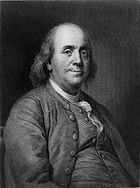
Ben Franklin effect
Encyclopedia

In the words of Benjamin Franklin
Benjamin Franklin
Dr. Benjamin Franklin was one of the Founding Fathers of the United States. A noted polymath, Franklin was a leading author, printer, political theorist, politician, postmaster, scientist, musician, inventor, satirist, civic activist, statesman, and diplomat...
, who famously observed the effect and for whom it is named, "He that has once done you a Kindness will be more ready to do you another, than he whom you yourself have obliged."
This perception
Perception
Perception is the process of attaining awareness or understanding of the environment by organizing and interpreting sensory information. All perception involves signals in the nervous system, which in turn result from physical stimulation of the sense organs...
of Franklin has been cited as an example within cognitive dissonance
Cognitive dissonance
Cognitive dissonance is a discomfort caused by holding conflicting ideas simultaneously. The theory of cognitive dissonance proposes that people have a motivational drive to reduce dissonance. They do this by changing their attitudes, beliefs, and actions. Dissonance is also reduced by justifying,...
theory, which says that people change their attitudes or behavior to resolve tensions, or "dissonance", between their thoughts, attitudes, and actions. In the case of the Ben Franklin effect, the dissonance is between the subject's negative attitudes to the other person and the knowledge that they did that person a favor.
In his autobiography, Franklin explains how he dealt with the animosity of a rival legislator when he served in the Pennsylvania legislature in the 18th Century
"Having heard that he had in his library a certain very scarce and curious book, I wrote a note to him, expressing my desire of perusing that book, and requesting he would do me the favour of lending it to me for a few days. He sent it immediately, and I return'd it in about a week with another note, expressing strongly my sense of the favour. When we next met in the House, he spoke to me (which he had never done before), and with great civility; and he ever after manifested a readiness to serve me on all occasions, so that we became great friends, and our friendship continued to his death."

